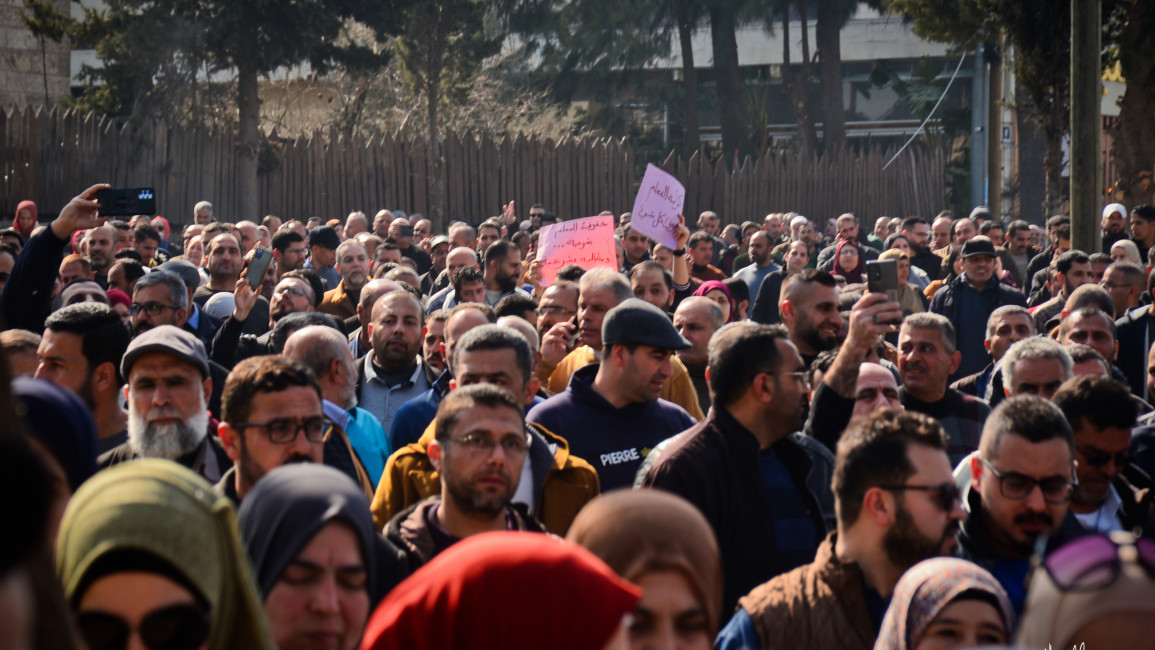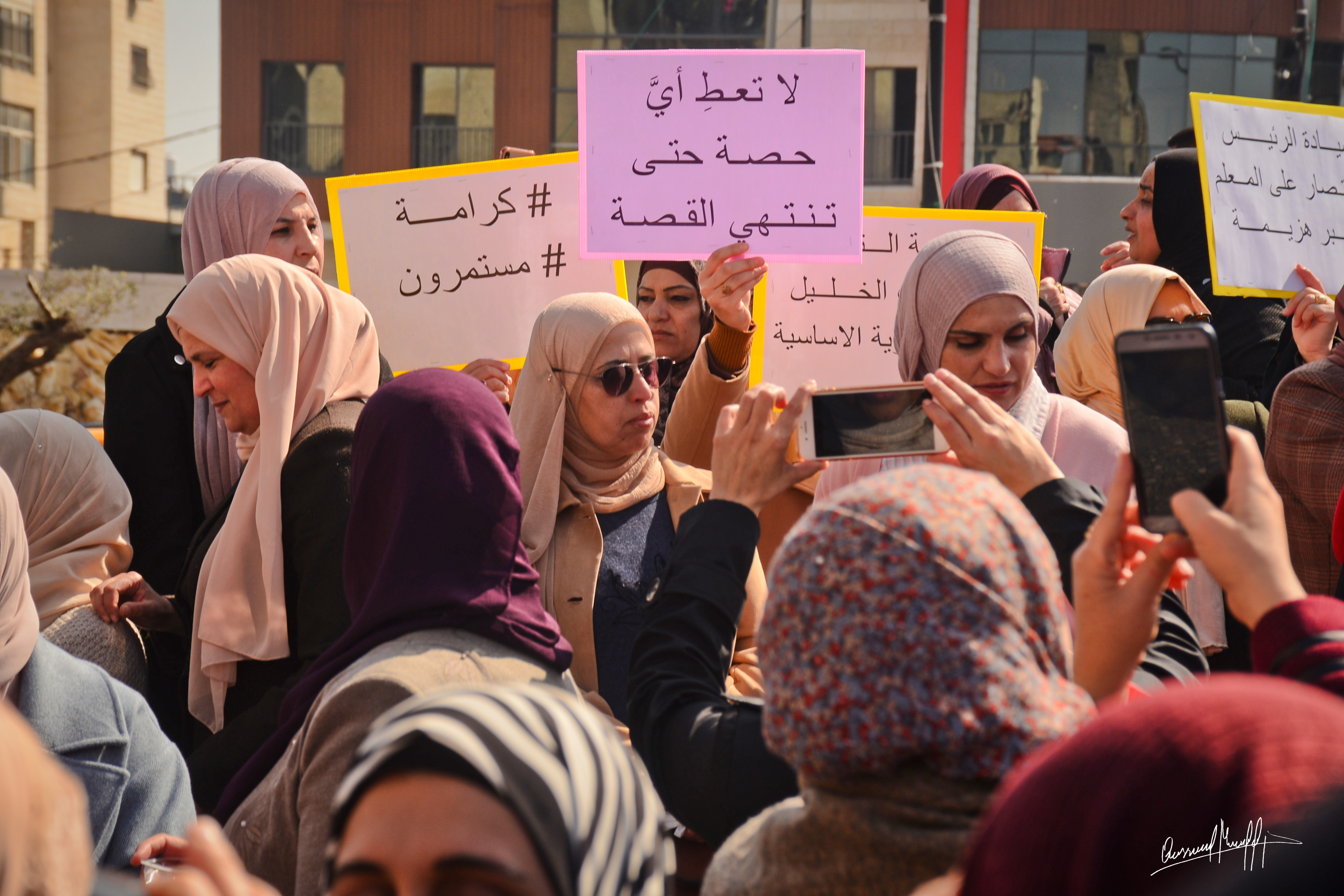Palestinian teachers vow to continue strike after controversial court ruling
Palestinian teachers accused the Palestinian Authority of "waging a war of retribution" against them as they announced a continuation of their general strike that has been ongoing since early February.
The announcement was made in a statement released on Tuesday by the "Unified Movement of Teachers", the unofficial body leading the strike. The announcement also demanded salary increases and the right to independent union representation.
The statement came in response to a ruling by the Palestinian administrative court outlawing the strike and ordering teachers to resume classes.
The ruling came after the Palestinian government filed an "urgent case" late on Monday before the administrative court following a march in Ramallah on Monday called on by the teachers' movement, in which thousands of teachers took part.
Palestinian teachers vow to continue their strike until demands are met https://t.co/Caox4S2dlJ pic.twitter.com/ChU9Qc8u8f
— Arab News (@arabnews) March 14, 2023
The teachers' movement called the court's ruling "a transgression against the law and the constitution" and added that the names of the 123 teachers mentioned in the ruling included retired teachers and others who weren't taking part in the strike. The movement considered the ruling as "a sign of confusion" by the PA and the administrative court.
The court's ruling was criticised by the Palestinian BAR Association's human rights observatory, which said on Tuesday that the ruling "lacks the essential elements of a fair trial as the teachers were not given the right to defend themselves."
The observatory also called the ruling "a grave violation of human rights and the fundamental right to strike."
Palestinian teachers' demands have been articulated since 2016 when the PA ended by the teachers' strike by signing an agreement, which supposedly has the PLO officially recognise a non-elected teachers union and didn't meet the strike's demands.
Striking teachers responded by adding a new demand to form their own independent union.
In the following year, many of the strike's public leaders were forced into early retirement, which some human rights groups described as a form of punishment.
Thousands of Palestinian teachers demonstrate outside the office of the Palestinian Authority's Prime Minister in Ramallah, demanding fulfilment of their overdue moral and financial rights, including the right to full payment of their monthly salary, today. pic.twitter.com/CHDtoxed0n
— Quds News Network (@QudsNen) March 13, 2023
Palestinian teachers went on general strike in April of last year, then again in August, before reaching an agreement with the Palestinian government, by which the government committed to a 15% increase to the teachers' first salary in 2023 and pleaded to allow teachers to form their union and elect their representatives.
However, teachers went back on strike last February after they didn't receive the agreed raise on their salaries, and their request to form an independent union had not been approved.
"After 2016, many thought that we were broken and that our case was buried," a teacher and coordinator of the strike in Ramallah, who asked not to be named, said to The New Arab.
"Yet, here we are in the streets again by the thousands, and the reasons are simple and clear," said the teacher. "It's hunger; it never went away, and it's not better than the government's punishments," they stressed.
Hundreds of Palestinian teachers demonstrate outside the office of the Palestinian Authority's Prime Minister in Ramallah in protest of the PA's failure to fulfill their overdue moral and financial rights, today. pic.twitter.com/8phpQk3j1F
— Quds News Network (@QudsNen) March 13, 2023
"I have two daughters in university and a third in school. I'm a single parent because my spouse was killed by the Israeli occupation. I have been teaching for twenty years with my US$1,000 salary, taking a second job to make ends meet and never received a raise, while prices continue to inflate on everything," pointed out the teacher.
"I can't complain because we don't have a union, and many of my colleagues have worse conditions, doing three jobs and drowning in debt. What can they threaten us with? We are already being punished," the teacher exclaimed.
"The thousands that protested in Ramallah on Monday will retake the streets, and the strike will continue until the government honours the agreement that it signed last year," they stated.
"Most importantly, we are determined to form our union because it will allow us to fight for many pending issues, like the rights of retired teachers, the rights of substitutes who work for years without a fixed contract and our right to promotion, which all other public service workers have," they added.
Last week, Palestinian Prime Minister Mohammad Shtayyeh announced a 5% raise to all public servants, including teachers, adding that "it will be paid when the resources will be available".
Shtayyeh's announcement came after unions for doctors and engineers released statements demanding salary raises and warned that they too will launch a strike.
"It's true that the PA is in a financial crisis, but that should be a reason to review the public policy, especially wealth distribution," Mahmoud Zyadeh, head of the Palestinian Federation of Independent Unions, told TNA.
"The lack of resources should be a reason to open a social dialogue over how to distribute the public budget and collect taxes, in a way consistent with social justice," said Zyadeh.
"This means that there should be a social representation of all sectors to contribute to such a dialogue, which is why public teachers demand an independent union, otherwise the government would be having the dialogue with itself," he added.
The PA has been experiencing a financial crisis since last year that has been described as the worst in the PA's history. The crisis is mainly due to Israel withholding Palestinian custom money that it collects on behalf of the PA, given its control over borders.
The crisis was aggravated earlier this year after a series of Israeli financial sanctions against the PA, which included the deduction of hundreds of millions of dollars from the Palestinian custom money. The sanctions were condemned by over 90 countries.
According to a report by the Palestinian 'Civil Team for Public Budget Transparency', a coalition of civil organisations headed by the public anti-corruption watchdog, AMAN, the PA spent less than 20% of its public budget on education in the first semester of last year, while security received 23% of the public budget.


![The brutal assault on Khan Younis has killed dozens and displaced thousands more [Getty]](/sites/default/files/styles/image_330x185/public/2024-07/GettyImages-2162526709.jpg?h=d3eda8cf&itok=n5N-o8p5)
![Members of the Algerian delegation threw roses into the Seine [Getty]](/sites/default/files/styles/image_330x185/public/2024-07/GettyImages-2162980872.jpg?h=199d8c1f&itok=h_3o_TOL)
